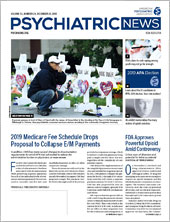Participating in a brief course of individualized metacognitive training—a psychotherapy designed to specifically target delusional beliefs—can reduce the severity of delusions and positive symptoms in patients with schizophrenia, according to a study posted October 30 in Schizophrenia Bulletin.
The study found that patients who received metacognitive training (MCT) had significant reductions in delusional thinking compared with patients who received cognitive remediation, a program designed to improve cognitive abilities. These improvements were maintained at six months.
The findings “suggest that even brief psychotherapy can help to ameliorate the symptoms of psychosis,” Ryan P. Balzan, Ph.D., of Flinders University in Adelaide, Australia, and colleagues wrote.
MCT is a manualized, group-based program that targets the cognitive biases that have been shown by research to be linked to the formation and maintenance of delusional beliefs. These biases include overconfidence, inflexibility of beliefs, and a bias toward jumping to conclusions not supported by evidence. MCT encourages participants to “think about their thinking,” raising metacognitive awareness of these biases and planting “seeds of doubt,” Balzan and colleagues wrote.
For the purposes of the study, a specialized therapy—MCT-plus (MCT+)—was developed combining metacognitive training with elements of individual cognitive-behavioral therapy.
The researchers recruited patients with a schizophrenia spectrum diagnosis and current delusions. To be eligible, participants were required to be between ages 18 and 65 years; diagnosed with a schizophrenia spectrum disorder; and have a current delusional belief, defined as a score of 3 or greater on the “delusions” item of the Positive and Negative Syndrome Scale (PANSS).
Of the 54 patients included in the trial, 52 were taking antipsychotic medications; these patients continued to receive their medication throughout the study.
The patients were randomly assigned to MCT+ or cognitive remediation. Patients in the MCT+ group completed four two-hour sessions with a therapist over one month.
Patients in the cognitive remediation group completed four therapist-led, 90-minute to two-hour sessions over the same timeframe, during which they focused on improving working and verbal memory, processing speed, problem solving, and attention—cognitive domains commonly impaired in patients with schizophrenia.
The researchers assessed the patients’ delusions, positive symptoms, performance in several cognitive domains, and clinical insight (awareness of and attitudes toward mental illness) at the start of the trial, following the completion of the four therapy sessions, and six months later. Two patients did not complete the six-month assessment.
Patients in the MCT+ group showed significant reductions in delusional and overall positive symptom severity and improved clinical insight relative to patients in the cognitive remediation group. There was a large reduction in the delusions score on PANSS from baseline to posttreatment following MCT+, and a further small, significant improvement from posttreatment to follow-up at six months.
Compared with those in the metacognitive training group, patients in the cognitive remediation group showed moderate improvement in problem-solving ability but in no other cognitive domains. The authors wrote that this suggests “more CR [cognitive remediation] might be required to be effective in these domains.”
“Despite the brevity of the active treatment condition, the findings suggest that MCT+ led to strong and significant improvements in delusional severity and overall positive symptomology, which were maintained at six-month follow-up,” the authors wrote. “While both interventions were observed to improve general psychopathology and illness insight, MCT+ appeared to have a stronger and longer-term influence. Although previous trials have also shown that MCT can improve clinical insight, this was the first trial to show that improvements could be maintained long term.”
They added that the MCT+ program includes content aimed at reducing self-stigma and improving self-esteem, which may have contributed to these findings.
In conclusion, the authors wrote, “While larger multisite trials investigating MCT+ are warranted, the present study adds to the growing literature that psychological interventions can be effective in people with psychosis.”
This research was supported by Flinders University and the Trevor Prescott Freemasons Memorial Scholarship. ■
“Individualized Metacognitive Training Reduces Delusional Symptoms in Psychosis: A Randomized Clinical Trial” can be accessed
here.
